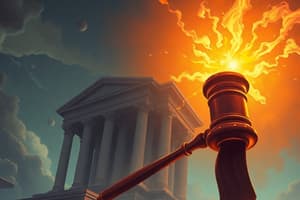Podcast
Questions and Answers
What is the highest legal authority in a country?
What is the highest legal authority in a country?
- The Constitution (correct)
- International Treaties
- Federal Law
- Common Law
What does the principle of separation of powers entail?
What does the principle of separation of powers entail?
- Judicial decisions are subject to legislative approval
- Government responsibilities are divided among branches (correct)
- All branches have equal influence over legislation
- Executive actions require judicial consent
Which mechanism ensures that each government branch can limit the powers of the others?
Which mechanism ensures that each government branch can limit the powers of the others?
- Constitutional Amendments
- Federalism
- Judicial Review
- Checks and Balances (correct)
Which of the following is a fundamental right typically guaranteed by a constitution?
Which of the following is a fundamental right typically guaranteed by a constitution?
What is the term for the power of courts to evaluate the constitutionality of laws?
What is the term for the power of courts to evaluate the constitutionality of laws?
What is commonly required for amending a constitution?
What is commonly required for amending a constitution?
Which of the following approaches to constitutional interpretation focuses on the literal meaning of the text?
Which of the following approaches to constitutional interpretation focuses on the literal meaning of the text?
Which landmark case established the principle of judicial review?
Which landmark case established the principle of judicial review?
Flashcards are hidden until you start studying
Study Notes
Definition
- Constitutional law involves the interpretation and implementation of the constitution, which is the supreme law of a country.
Key Concepts
-
Supremacy of the Constitution
- The constitution is the highest legal authority.
- Any law or government action contrary to the constitution is invalid.
-
Separation of Powers
- Division of government responsibilities into distinct branches: Executive, Legislative, and Judicial.
- Each branch operates independently and has its own powers and responsibilities.
-
Checks and Balances
- Mechanisms that allow each branch of government to limit the powers of the others.
- Prevents abuse of power and ensures accountability.
-
Fundamental Rights
- Basic human rights guaranteed by the constitution.
- May include freedom of speech, religion, assembly, and due process.
-
Judicial Review
- The power of courts to assess whether a law or policy is constitutional.
- Allows courts to overturn laws or executive actions that violate the constitution.
-
Amendments
- Process by which changes can be made to the constitution.
- Typically involves a proposal followed by ratification through a supermajority in the legislature or by state approval.
Types of Constitutional Law
- Substantive Law: Governs the rights and duties of individuals and collective bodies.
- Procedural Law: Dictates the processes through which the law is enforced and rights are upheld.
Important Principles
- Rule of Law: All individuals and institutions are accountable to the law.
- Federalism: Division of power between national and state governments.
- Due Process: Legal requirement that the state must respect all legal rights owed to a person.
Constitutional Interpretation
- Different approaches include:
- Textualism: Focus on the literal meaning of the text.
- Originalism: Interpretation based on the intent of the framers.
- Living Constitution: Adaptation of the constitution to contemporary society.
Landmark Cases
- Marbury v. Madison: Established the principle of judicial review.
- Brown v. Board of Education: Declared racial segregation in public schools unconstitutional.
- Roe v. Wade: Recognized the constitutional right to privacy in the context of abortion.
Recent Developments
- Ongoing debates over issues such as voting rights, healthcare, and civil liberties.
- Impact of technology on privacy and constitutional rights.
Conclusion
- Constitutional law is essential for maintaining democracy and protecting individual rights.
- It evolves through amendments, interpretations, and judicial decisions.
Definition
- Constitutional law governs the interpretation and application of a country’s constitution, the supreme legal authority.
Key Concepts
- Supremacy of the Constitution: The constitution has primacy over all laws and government actions; anything conflicting is deemed invalid.
- Separation of Powers: Divides government roles into three branches: Executive, Legislative, and Judicial, each with distinct functions.
- Checks and Balances: Ensures no branch becomes too powerful by enabling each to monitor and limit the others’ authority.
- Fundamental Rights: Basic human rights protected by the constitution, including freedoms of speech, religion, assembly, and due process.
- Judicial Review: The judiciary's authority to evaluate laws or policies' constitutionality, allowing them to invalidate those that violate constitutional principles.
- Amendments: The process for altering the constitution, typically requiring a supermajority for proposals and ratification.
Types of Constitutional Law
- Substantive Law: Defines rights and obligations of individuals and groups.
- Procedural Law: Outlines the methods and processes for enforcing laws and protecting rights.
Important Principles
- Rule of Law: Ensures all individuals and governing bodies are subject to the law.
- Federalism: Distributes power between national and state governments to encourage local governance.
- Due Process: Guarantees that the state must honor all legal entitlements owed to individuals.
Constitutional Interpretation
- Textualism: Emphasizes the literal meaning of constitutional text.
- Originalism: Focuses on the intentions of the framers during the constitution's creation.
- Living Constitution: Views the constitution as a dynamic document that evolves with societal changes.
Landmark Cases
- Marbury v. Madison: Established judicial review as a key principle.
- Brown v. Board of Education: Ruled that racial segregation in public schools violates the constitution.
- Roe v. Wade: Affirmed a constitutional right to privacy related to abortion.
Recent Developments
- Ongoing discussions surrounding voting rights, healthcare access, and civil liberties in response to contemporary issues.
- Emerging concerns about how technology affects privacy and other constitutional rights.
Conclusion
- Constitutional law plays a crucial role in upholding democracy and protecting individual freedoms, continuously shaped by amendments, judicial interpretations, and landmark cases.
Studying That Suits You
Use AI to generate personalized quizzes and flashcards to suit your learning preferences.





